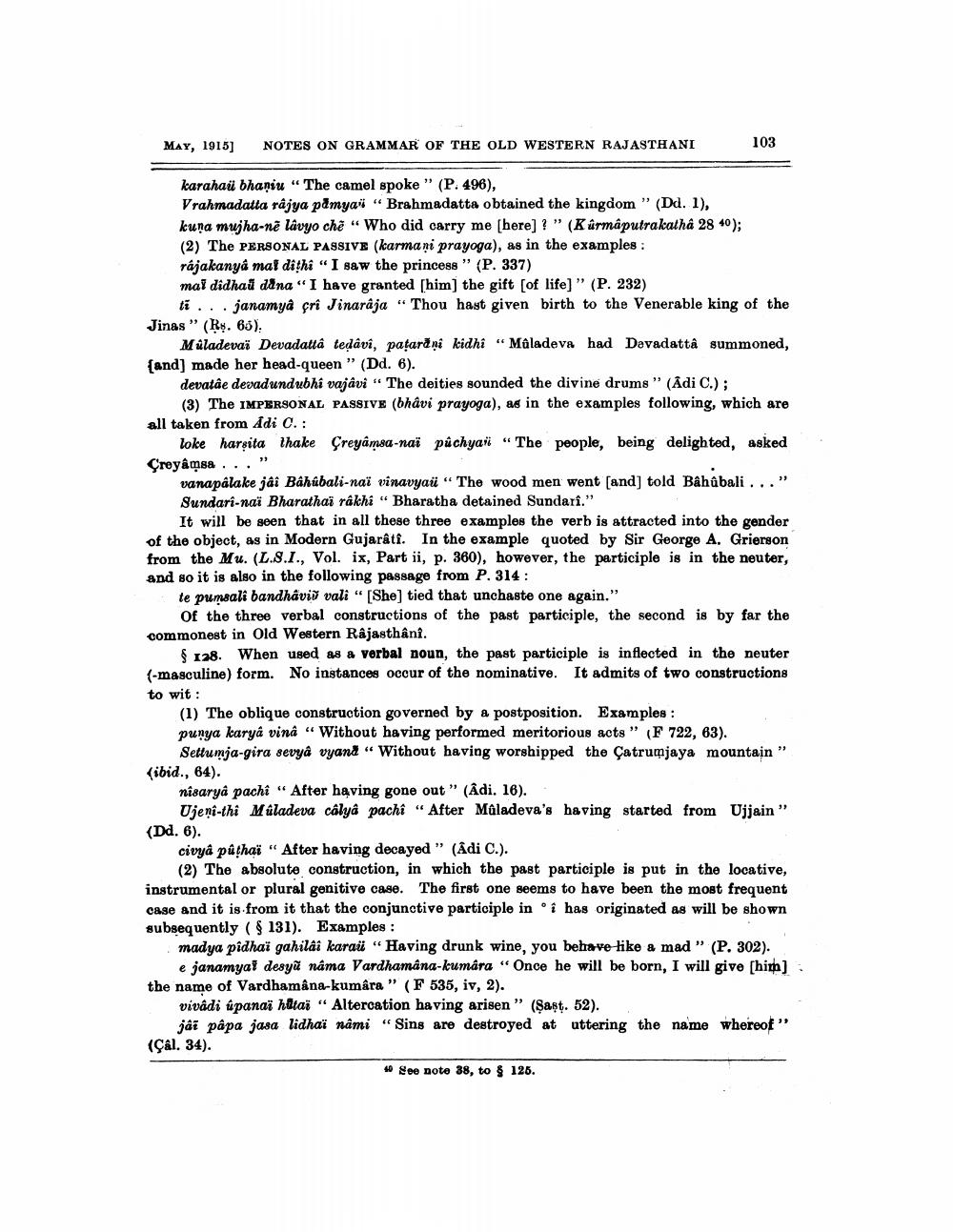________________
MAY, 1915]
NOTES ON GRAMMAR OF THE OLD WESTERN RAJASTHANI
103
karahaü bhaniu “The camel spoke" (P. 496), Vrahmadatta rajya pamyai "Brahmadatta obtained the kingdom" (Dd. 1), kuna mujha-nê làvyo che “Who did carry me (here] ? " (Kurmaputra katha 28 40); (2) The PERSONAL PASSIVE (karmani prayoga), as in the examples : rájakanya mal dithi " I saw the princess" (P. 337) mai didhaŭ dana "I have granted [him) the gift [of life]” (P. 232)
ti ... janamya çrî Jinaraja “Thou hast given birth to the Venerable king of the Jinas" (Rs. 65).
Måladevaï Devadattá tedavi, patară ni kidhi "Mâladeva had Devadatta summoned, {and] made her head-queen" (Dd. 6).
devatâe devadundubhi vajavi " The deities sounded the divine drums" (Adi C.);
(3) The IMPERSONAL PASSIVE (bhavi prayoga), as in the examples following, which are all taken from Adi C.:
loke harşita thake Çreyamsa-nai púchyari “The people, being delighted, asked Çreyâmsa ..."
vanapalake jäi Bahubali-nai vinavyaü "The wood men went [and] told Bahûbali ..." Sundari-nai Bharathaï rakhi “ Bharatha detained Sundari."
It will be seen that in all these three examples the verb is attracted into the gender of the object, as in Modern Gujarati. In the example quoted by Sir George A. Grierson from the Mu. (L.S.I., Vol. ix, Part ii, p. 360), however, the participle is in the neuter, and so it is also in the following passage from P. 314 :
te pumsali bandhävið vali " [She] tied that unchaste one again."
Of the three verbal constructions of the past participle, the second is by far the commonest in Old Western Râjasthâni.
$ 128. When used as a verbal noun, the past participle is inflected in the neuter (-masculine) form. No instances occur of the nominative. It admits of two constructions to wit :
(1) The oblique construction governed by a postposition. Examples : punya karya vina “ Without having performed meritorious acts" (F 722, 63).
Settumja-gira sevya vyand “Without having worshipped the Çatrumjaya mountain" (ibid., 64).
nisaryâ pachi "After having gone out " (Âdi. 16).
Ujeni-thi Múladeva calya pachi "After Müladeva's having started from Ujjain" (Dd. 6).
civya půthaï " After having decayed " (Âdi C.).
(2) The absolute construction, in which the past participle is put in the locative, instrumental or plural genitive case. The first one seems to have been the most frequent case and it is from it that the conjunctive participle in i has originated as will be shown subsequently ( 131). Examples:
madya pidhai gahildi karait "Having drunk wine, you behave like a mad" (P. 302).
e janamyal desyū nama Vardhamana-kumara "Once he will be born, I will give [him) the name of Vardhamana-kumara" (F 535, iv, 2).
vivadi úpanaj hltaj "Altercation having arisen " (Saßt. 52).
jai papa jasa lidhaï nami "Sins are destroyed at uttering the name whereof." (Çal. 34).
40 See note 38, to § 126.




